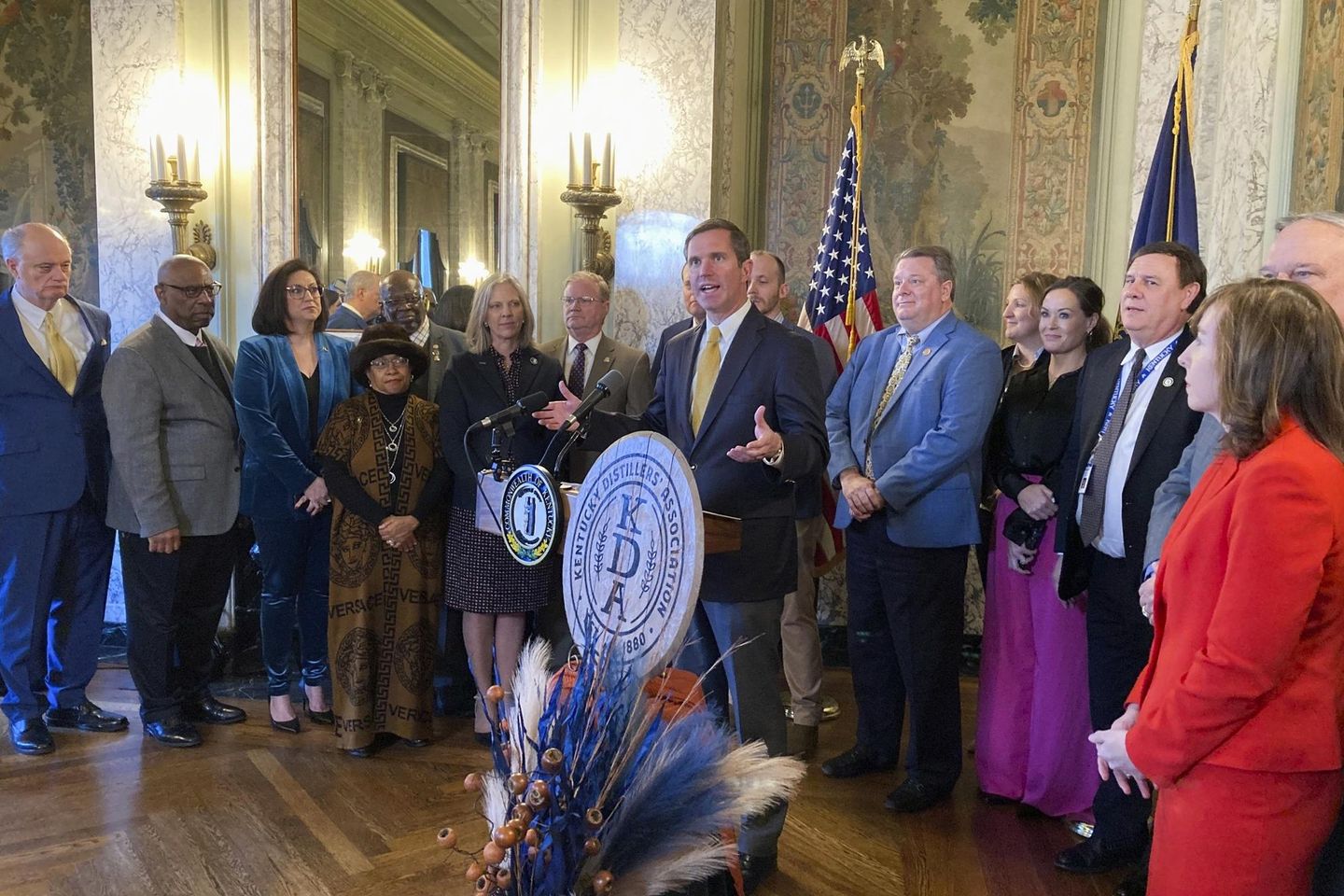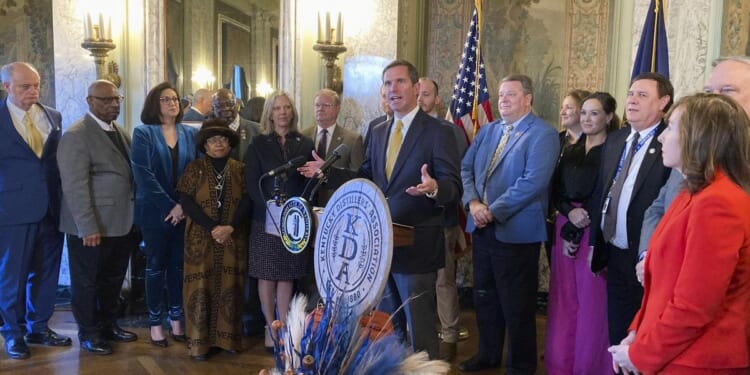
FRANKFORT, Ky. — Fifteen years ago, bourbon barons poured whiskey out on the steps of the Kentucky Capitol to protest a looming tax increase on the spirits industry. On Tuesday, industry leaders reassembled with a bipartisan group of Kentucky leaders to toast the bourbon sector’s record growth.
Kentucky’s bourbon industry pumps $9 billion into the Bluegrass State’s economy each year, creating more jobs and attracting more tourists than ever before, according to a study released Tuesday. More rounds of growth are expected as Kentucky producers make billions of dollars in capital investments.
Democratic Gov. Andy Beshear praised the bourbon industry for its “unique and enormous role in driving our economy and representing Kentucky to the rest of the world.” Top Republican lawmakers pointed to a series of legislative actions credited with helping propel the industry’s growth. Kentucky distillers produce 95% of the global bourbon supply, according to the Kentucky Distillers’ Association.
Bill Samuels Jr. attended the celebration on Tuesday. He also took part in the protest years ago, when he was the top executive at Maker’s Mark and joined other industry leaders in pouring bourbon onto the statehouse steps. It marked a turning point for the legislature and distillers, Samuels said in an interview Tuesday.
“I think it was the end of ignoring the industry. And it really was a fruitful beginning of a partnership that has paid huge dividends” for the state, said Samuels, now retired.
It was a vastly different business climate for Kentucky bourbon producers in 2009, when they had much smaller inventories totaling about 4.6 million barrels. “It seemed kind of silly because most of us were short of whiskey, to be pouring it out on the steps.”
Kentucky distillers produced a record 2.7 million barrels of bourbon in 2022 – the fifth consecutive year that production topped 2 million barrels, according to the economic impact report, which was commissioned by the distillers’ association.
Producers had a record inventory of 12.6 million bourbon barrels aging in warehouses at the start of 2023, it said. Those massive inventories are a bet on the future because most bourbons typically age four to eight years before reaching their market. Bourbon gets its flavor and golden brown color during aging.
Kentucky has 100 licensed distilleries operating in more than a third of the state’s 120 counties. Distilling generates more than 23,100 Kentucky jobs with annual wages exceeding $1.6 billion. Bourbon tourism has flourished, with attendance surpassing 2.5 million visitors last year along the Kentucky Bourbon Trail and the Kentucky Bourbon Trail Craft Tour, which showcases smaller distilleries.
The distilling industry generated $358 million in state and local taxes last year, the study said. And distilleries have become big buyers of Kentucky corn and other grains.
The frosty relationship between distillers and the legislature back in 2009 thawed long ago. And it produced a series of laws that the industry says helped spark the growth of bourbon production and bourbon-related tourism.
Most notably a decade ago, Kentucky lawmakers approved a credit to offset the cost of a tax on aging barrels of distilled spirits. Distillers still paid the tax – mostly benefiting public schools – but they got the money back through the tax credit. Distillers responded by making massive investments to expand their operations. Other measures passed by lawmakers catered to bourbon tourism.
The industry’s growth is an example of “what happens when government works with stakeholders and risk takers,” said Kentucky House Speaker David Osborne, a Republican.
The event itself showed bourbon’s clout in the Bluegrass State. Attending the event in the State Reception Room at the Capitol were statewide constitutional officers and legislators from both parties.
“We like to say bourbon brings people together, but when’s the last time you all saw this many leaders of Kentucky in one room? And we didn’t even have to promise samples to get them here,” quipped Eric Gregory, president of the distillers’ association.
Samuels, who oversaw the rise of Maker’s Mark into a global brand recognizable by its red wax seal, said the industry’s prospects are “a thousand times better” than they were 15 years ago.
“When I started, we couldn’t recruit anybody,” Samuels said. “And now, we have people from Ivy League schools …. contacting us about a job. Some of the smartest young people have moved to Kentucky. So the brainpower that the industry has brought to Kentucky is enormous.”












